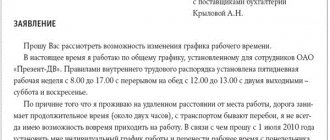The duration of daily work (shift) cannot exceed: for workers aged from fifteen to sixteen years - 5 hours, for workers aged from sixteen to eighteen years - 7 hours; for students in basic general education programs and educational programs of secondary vocational education, combining education with work during the academic year, from fourteen to sixteen years old - 2.5 hours, from sixteen to eighteen years old - 4 hours; for disabled people - in accordance with a medical report issued in the manner established by federal laws and other regulatory legal acts of the Russian Federation. For workers employed in jobs with harmful and (or) dangerous working conditions, where reduced working hours are established, the maximum permissible duration of daily work (shift) cannot exceed: for a 36-hour work week - 8 hours; with a 30-hour work week or less - 6 hours.
An industry (inter-industry) agreement and a collective agreement, as well as with the written consent of the employee, formalized by concluding a separate agreement to the employment contract, may provide for an increase in the maximum permissible duration of daily work (shift) compared to the duration of daily work (shift) established by part the second of this article for workers engaged in work with harmful and (or) dangerous working conditions, subject to the maximum weekly working hours established in accordance with parts one - three of Article 92 of this Code: with a 36-hour work week - up to 12 hours; with a 30-hour work week or less - up to 8 hours.
Duration of daily work (shift) of creative workers of the media, cinematography organizations, television and video crews, theaters, theatrical and concert organizations, circuses and other persons involved in the creation and (or) performance (exhibition) of works, in accordance with the lists jobs, professions, positions of these workers, approved by the Government of the Russian Federation, taking into account the opinion of the Russian Tripartite Commission for the Regulation of Social and Labor Relations, can be established by a collective agreement, a local regulatory act, or an employment contract.
Article 94 of the Labor Code of the Russian Federation. Duration of daily work (shift)
1. The duration of daily work has a direct impact on a person’s performance. Long-term continuous work tires a person, leads to a decrease in his performance (decreased speed of movements, weakened attention, making mistakes, decreased productivity, etc.), and affects his health. Therefore, the legislation establishes not only the weekly standard of working time, but also the maximum permissible duration of daily work for a number of categories of workers.
Moreover, these requirements must be met not only when distributing the weekly norm of working time, but also when distributing working time within the accounting period.
2. The specific duration of daily work (shift) is determined by internal labor regulations or shift schedules for both a 5-day and a 6-day working week, in compliance with the requirements for the maximum permissible duration of a working day (shift).
Thus, according to Part 1 of Article 94 of the Labor Code of the Russian Federation, the daily working hours are established primarily for persons under 18 years of age. Moreover, for students of general education institutions, educational institutions of primary and secondary vocational education, who combine study with work during the academic year, the norm for the duration of daily work has been changed compared to the previous edition of the commented article. For example, for persons aged 16 to 18 years, the duration of a daily shift could not exceed 3.5 hours. Federal Law No. 90-FZ of June 30, 2006 allowed workers of the specified age to increase the duration of daily work to 4 hours.
3. The duration of daily work (shift) for disabled people is established in accordance with a medical report issued in the manner established by federal laws and other regulatory legal acts of the Russian Federation. In particular, the recommended duration of daily work (shift) for a disabled person is indicated in an individual rehabilitation program, which is issued based on the results of a medical and social examination conducted by the institution of the state medical and social examination service for recognizing a citizen as disabled. An individual rehabilitation program for a disabled person is mandatory for execution by any organizations, regardless of their organizational and legal forms and forms of ownership (Article 11 of the Law on the Protection of Persons with Disabilities).
4. With regard to workers engaged in work with harmful and (or) dangerous working conditions, the commented article retains the general requirement that with a 36-hour work week, the duration of daily work cannot exceed 8 hours; with a 30-hour work week or less - 6 hours.
At the same time, Part 3 of Article 94 of the Labor Code of the Russian Federation allows for the possibility of increasing the duration of daily work (shift) by collective agreement compared to the duration of daily work (shift) established by Part 2 of this article for workers engaged in work with harmful and (or) dangerous working conditions, subject to compliance with the maximum weekly working hours (Part 1 of Article 92 of the Labor Code) and hygienic standards for working conditions established by federal laws and other regulatory legal acts of the Russian Federation. It seems that the establishment of such a regime should be considered only as an exception, allowed under the systematic control of the territorial bodies of Rospotrebnadzor.
As follows from the note to the concept of “hygienic standards for working conditions,” hygienic standards are justified taking into account an 8-hour work shift. For longer shifts, but not more than 40 hours per week, in each specific case the possibility of work must be agreed upon with the territorial departments of the Federal Service for Surveillance on Consumer Rights Protection and Human Welfare, taking into account the health indicators of workers (based on periodic medical examinations, etc. .), the presence of complaints about working conditions and mandatory compliance with hygienic standards (see paragraph 3 of the section “Basic concepts used in the Manual” // Guide to the hygienic assessment of factors in the working environment and the labor process. Criteria and classification of working conditions. R2.2.2006 -05, approved by the Chief State Sanitary Doctor of the Russian Federation on July 29, 2005).
5. The normal working hours for creative workers of cinematography organizations, television and video crews, theaters, theater and concert organizations, circuses, the media, professional athletes, as well as other workers, cannot exceed 40 hours a week. However, the duration of the daily work (shift) of these categories of workers in accordance with the lists of jobs, professions, positions of these workers, approved by the Government of the Russian Federation, taking into account the opinion of the Russian Tripartite Commission for the Regulation of Social and Labor Relations, may be established by a collective agreement, a local regulatory act, or an employment contract ( list of professions and positions of creative workers in the media, cinematography organizations, television and video crews, theaters, theatrical and concert organizations, circuses and other persons involved in the creation and (or) performance (exhibition) of works, the specifics of their labor activity are established by Trudov Code of the Russian Federation, approved by Decree of the Government of the Russian Federation of April 28, 2007 N 252 (SZ RF. 2007. N 19. Art. 2356)).
On the specifics of regulating the labor of these creative workers, see Art. 351 and comments. To her.
Article 94. Duration of daily work (shift)
Determination of the Constitutional Court of the Russian Federation dated October 18, 2012 N 1983-O 1. In his complaint to the Constitutional Court of the Russian Federation, citizen R.V. Kharlamov disputes the constitutionality of part three of article of the Labor Code of the Russian Federation, according to which a collective agreement may provide for an increase in the duration of daily work (shift) compared to the duration of daily work (shift) established by part two of this article for workers engaged in work with hazardous and ( or) hazardous working conditions, subject to compliance with the maximum weekly working hours (part one of Article 92 of this Code) and hygienic standards for working conditions established by federal laws and other regulatory legal acts of the Russian Federation.
Decision of the Supreme Court of the Russian Federation dated April 15, 2004 N GKPI2004-481
For this category of workers, by virtue of an article of the Labor Code of the Russian Federation, with a 36-hour week, the duration of daily work (shift) cannot exceed 8 hours. From the content of Article 104 of the Labor Code of the Russian Federation it follows that in organizations or when performing certain types of work, where, due to production (work) conditions, the daily or weekly working hours established for a given category of workers cannot be observed, it is allowed to introduce summarized recording of working hours in order to so that the duration of working hours for the accounting period (month, quarter, etc.) does not exceed the normal number of working hours.
Decision of the Supreme Court of the Russian Federation dated February 26, 2008 N GKPI08-8
S. appealed to the Supreme Court of the Russian Federation with an application to invalidate paragraph 4 of the Rules and paragraph 5 of the Explanation in the part establishing that special work experience includes periods of work performed constantly during a full working day, which means performing work under special conditions labor at least 80 percent of working time. In his opinion, the contested norms in this part contradict articles - , 104 of the Labor Code of the Russian Federation, which disclose the concept of working time and allow, when daily or weekly working hours cannot be observed, the introduction of summarized recording of working time, as well as paragraph 2 of Article 27 of the Federal the law “On Labor Pensions in the Russian Federation”, which does not allow the Government of the Russian Federation to exclude periods of work in hazardous working conditions. The applicant indicated that, on the basis of the contested regulations, he was denied inclusion in the special work experience of a period of part-time work from July 21, 1997 to December 31, 2000 at Nauchpribor CJSC as a commissioning and testing engineer.
Determination of the Supreme Court of the Russian Federation dated 06/03/2008 N KAS08-211
S. appealed to the Supreme Court of the Russian Federation with an application to invalidate paragraph 4 of the Rules and paragraph 5 of the Explanation in the part establishing that special work experience includes periods of work performed constantly during a full working day, which means performing work under special conditions labor at least 80 percent of working time. At the same time, the applicant indicated that the contested norms in this part contradict articles - , 104 of the Labor Code of the Russian Federation, which disclose the concept of working time and allow, when daily or weekly working hours cannot be observed, the introduction of summarized recording of working time, as well as paragraph 2 of the article 27 of the Federal Law “On Labor Pensions in the Russian Federation”, which does not allow the Government of the Russian Federation to exclude periods of work in hazardous working conditions. The applicant indicated that, on the basis of the contested regulations, he was denied inclusion in the special work experience of a period of part-time work from July 21, 1997 to December 31, 2000 at Nauchpribor CJSC as a commissioning and testing engineer.
Decision of the Supreme Court of the Russian Federation dated January 10, 2013 N AKPI12-1467
The applicant believes that paragraph “d” of Section III of the Order, applied by the Zlatoust City Court of the Chelyabinsk Region when resolving a civil case with his participation, establishes for medical workers engaged in work with hazardous working conditions a working time of more than 36 hours per week and therefore contradicts part two of article of the Labor Code of the Russian Federation and paragraph 1 of the Decree of the Government of the Russian Federation of November 20, 2008 N 870 “On the establishment of reduced working hours, annual additional paid leave, increased wages for workers engaged in heavy work, work with hazardous and ( or) dangerous and other special working conditions” (hereinafter referred to as Resolution No. 870).
Resolution of the Plenum of the Supreme Court of the Russian Federation dated January 28, 2014 N 1
By virtue of articles of the Labor Code of the Russian Federation, reduced working hours are established: for minor workers under the age of sixteen years - no more than 24 hours per week, for workers aged from sixteen to eighteen years - no more than 35 hours per week. At the same time, the duration of daily work (shift) cannot exceed 5 hours for minors aged fifteen to sixteen years and 7 hours for minors aged sixteen to eighteen. For persons studying in organizations engaged in educational activities, during the academic year, working time standards are no more than 12 hours per week for workers under the age of sixteen and no more than 17.5 hours per week for workers between the ages of sixteen and eighteen. years. At the same time, the duration of daily work (shift) cannot exceed 2.5 hours for persons aged fourteen to sixteen years and 4 hours for persons aged sixteen to eighteen.
Resolution of the Plenum of the Supreme Court of the Russian Federation dated November 24, 2015 N 52
The duration of daily work for athletes under the age of eighteen may be established by collective agreements, agreements, local regulations (part two of Article 348.8 of the Labor Code of the Russian Federation) in excess of the maximum duration of daily work (shift) provided for in part one of article of the Labor Code of the Russian Federation for older workers up to eighteen years of age (5 hours for workers aged from fifteen to sixteen years and 7 hours for workers aged from sixteen to eighteen years), but subject to the maximum weekly working time established for such workers by part one of article of the Labor Code of the Russian Federation (24 hours per week for workers under the age of sixteen and 35 hours per week for workers between the ages of sixteen and eighteen).
Appeal ruling of the Appeal Board of the Supreme Court of the Russian Federation dated 10/08/2019 N APL19-347
In the appeal, the administrative plaintiffs ask to cancel the decision of the court of first instance, citing its illegality and groundlessness, and to make a new decision in the case to satisfy the stated claim in full. They indicate that the court of first instance made a decision without examining the issue of compliance with the law with the established practice of applying the contested norm, did not take into account the content of the concept “other locality” used in labor legislation, in particular in part two of Article 57, Article 72, part three of Article 72.1 of the Labor Code RF, and prohibiting the transfer of an employee to work in another area without his consent. The appeal refers to the fact that the possibility provided in the second paragraph of paragraph 7 of the Peculiarities not to include the employee’s travel time to a new place of work, located at a considerable distance from the permanent place of work, during working hours violates the employee’s rights to rest and compliance with the statutory working hours. (Part 5 of Article 37 of the Constitution of the Russian Federation, Articles , , Labor Code of the Russian Federation).
Decision of the Supreme Court of the Russian Federation dated June 27, 2019 N AKPI19-389
The Interregional Trade Union of Railway Workers (hereinafter referred to as the IRM) and M. appealed to the Supreme Court of the Russian Federation with an administrative claim to invalidate the provision of the paragraph of the second paragraph of the Features, citing the fact that it contradicts Articles , , and 72.1 of the Labor Code of the Russian Federation (hereinafter - Labor Code of the Russian Federation) and infringes on labor rights in the field of work and rest regime of both M. and the trade union, which unites a significant number of workers - train drivers and their assistants and represents their interests by virtue of Articles 11 and 23 of the Federal Law of January 12, 1996 N 10-FZ “On trade unions, their rights and guarantees of activity”, such as the right to rest, to comply with the statutory working hours, the right to work stipulated by the employment contract, and to protection from unjustified changes in the terms of the employment contract, including from moving an employee to another area without his consent, enshrined in part 5 of article 37 of the Constitution of the Russian Federation, articles , , 72.1, Labor Code of the Russian Federation.
Decision of the Supreme Court of the Russian Federation dated August 26, 2019 N AKPI19-469
P., who has a line pilot certificate, filed an administrative claim with the Supreme Court of the Russian Federation to invalidate clauses 3, 7, 35, 51 and 53 of the Regulations, citing their contradiction to Article 41 of the Constitution of the Russian Federation, Articles , , , 100, 107 , 108, 212, 329 of the Labor Code of the Russian Federation, Federal Law of November 21, 2001 N 323-FZ “On the fundamentals of protecting the health of citizens in the Russian Federation.” According to the administrative plaintiff, the Regulations were adopted by the administrative defendant in excess of his powers, since the Ministry of Transport of Russia, which proposes to take into account the opinion of the trade union organization that is part of the all-Russian trade union, is not a representative of the employer and cannot determine the work schedule. The contested act has not been agreed upon with the Ministry of Health of the Russian Federation and the Ministry of Labor and Social Protection of the Russian Federation, and the indication contained therein of mandatory compliance with its norms when drawing up work schedules for crew members prevents the implementation of his constitutional right to health protection during work activities.
Appeal ruling of the Appeal Board of the Supreme Court of the Russian Federation dated December 3, 2019 N APL19-431
Thus, in accordance with part two of article of the Labor Code of the Russian Federation for workers engaged in work with harmful and (or) dangerous working conditions, where reduced working hours are established, the maximum permissible duration of daily work (shift) cannot exceed: at 36- hourly working week - 8 hours; with a 30-hour work week or less - 6 hours. At the same time, part three of the named article establishes that an industry (inter-industry) agreement and a collective agreement, as well as with the written consent of the employee, formalized by concluding a separate agreement to the employment contract, may provide for an increase in the maximum permissible duration of daily work (shift) compared to the duration of daily work (shift) for workers engaged in work with harmful and (or) dangerous working conditions, subject to the maximum weekly working hours for a 36-hour work week - up to 12 hours.





